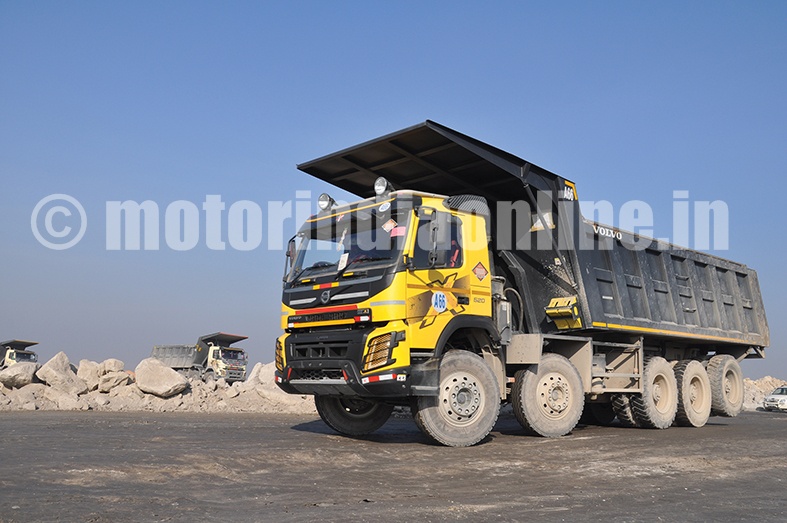“Volvo Trucks has the most advanced portfolio of products and is always in the forefront in introducing sophisticated technology and features both in terms of meeting the regulations and enhancing customer’s top and bottom line. We will be introducing some of these advanced features in 2017, which we will announce shortly” says Mr. GV Rao, Director – Product, Brand and Marketing, Volvo Trucks India.
Read on for Mr. Rao’s insights on the foreseeable future of the country’s truck industry and Volvo Trucks’ role in it.

BS-IV implications & readiness
“Environmental Care” as one of the Core values, Volvo has always been in forefront in bringing stringent emission norms to the market. As a global company, Volvo Trucks already sells vehicles up to Euro-6 emission norms in many parts of the world primarily in European and American countries. Volvo Trucks entered India with Euro-2 trucks in 1998, at the time when the emission norm in India were not even prevalent. Subsequently, we introduced Euro-3 trucks in 2006, way before it was made nationwide compulsory in 2010. We have been ready with our Euro-4 engine certification from 2015 and vehicle certification from early 2016. All the special infrastructure and tooling for Euro-4 truck assemblies already installed in our assembly plant in Hosakote. As per the regulatory requirement, we fully switched over to manufacturing of Euro-4 trucks since April 1, 2017. In my view, at a broader level all the OEMs have supported government’s move for stricter emission norms and that’s a very good sign for overall growth of the industry and signifying it’s commitment for environmental care.
GST impact
GST will be replacing the current host of indirect taxes with a credit mechanism of ‘all taxes paid on purchases’ as against the current tax system, wherein only certain taxes like Excise Duty and Local VAT paid are allowed as credit. Therefore, at the stage of purchases, currently CST paid is a cost of input and has cascading effect on the final value of the goods produced. GST will neutralise this effect and the final value of the goods are expected to be lower to the extent of embedded tax in the supply chain.
Secondly, under the current taxes, the inter-State transfer of goods from one location to another is not subjected to any taxation and this has led to setting up of warehouses / depots in other states to take benefit of taxes. Going forward under GST, tax is not a differentiator. Therefore, the entire supply chain may be redesigned by the OEMs to take advantage of cost arbitrage of managing warehouses and associated cost. This is expected to remodel the distribution streams and could be an opportunity for transport sector.
As a seller of truck, we are pretty excited about the introduction of GST in India. It will eliminate many bottlenecks from the transport system, making the process of movement of goods much more efficient. This is expected to create demand for high performance truck to be able to do more trips in given time. As the market moves towards high performance trucks, it would create more opportunity for Volvo trucks in the long haul segment where we have a global leadership position.
AC cabin
When Volvo entered into Indian market 19 years ago, driver’s comfort and safety were highly underrated terms in Indian trucking industry. The market was majorly skewed towards Cowls offering by OEMs, with minor presence of factory-fitted non-AC cabins. In words of our founders Assar Gabrielsson & Gustaf Larson “An automobile is made by and for people. The basic principle of all manufacturing is and must remain: safety.” Guided by that direction, from the time we entered India in 1998 and in line with our global offerings, we offered only factory-built full cabin, which meets the stringent of Crash test norms, viz., ECR29 and Swedish Impact test, in order to ensure highest level of safety to the drivers; and AC as standard fitment in all the cabins in order to provide high driver comfort while driving through toughest of conditions and for long driving hours.
We fully welcome the new regulation G.S.R. 1034 (E) issued by Ministry of Road Transport and Highways, which mandates the air-conditioning system to be fitted as standard for all the cabin from April 1, 2017. It’s need of the hour to provide safe and comfortable driving conditions to our drivers, in order to keep them alert while driving and healthy and motivated and general social upliftment of the driver fraternity in the country. Also, it is imperative that the currently unorganised sector of bodybuilder’s cabin is brought under standard norms.
Scrapping of old vehicles
The government has been discussing this legislation and conducting a dialogue with various stakeholders, and while the legislation has not been finalised yet, it is likely that there will be a scrapping policy for vehicles beyond particular ages. While this will impact both the passenger car and commercial vehicles sectors, a report by AT Kearny which showed M&HCVs accounting for 2.5 percent of country’s total fleet while contributing over 60 per cent of the air pollution has shifted focus on prioritizing its implementation on commercial vehicles.
The Indian auto industry is one of the largest in the world. And over last few years, it has undergone a major change in terms of new technologies and features introduced. Not only this, every automobile has a particular lifecycle, beyond which if it is used, the performance starts deteriorating, emission quality gets impacted, safety of the driver and surroundings gets at risk, etc. Therefore, scrapping of old truck will not only help to improve the average quality of trucks in the market, but also contribute towards better environment around. However, good incentive policies need to be laid out in order to encourage transporters for effective implementation of the same. For automobile and manufacturing sector, of course, it will be a big boost because of replacement demand. The used trucks market will be negatively impacted because of such movements, but I think eventually this decision would be holding long-term benefits for all the segments of society and facets of environment.
